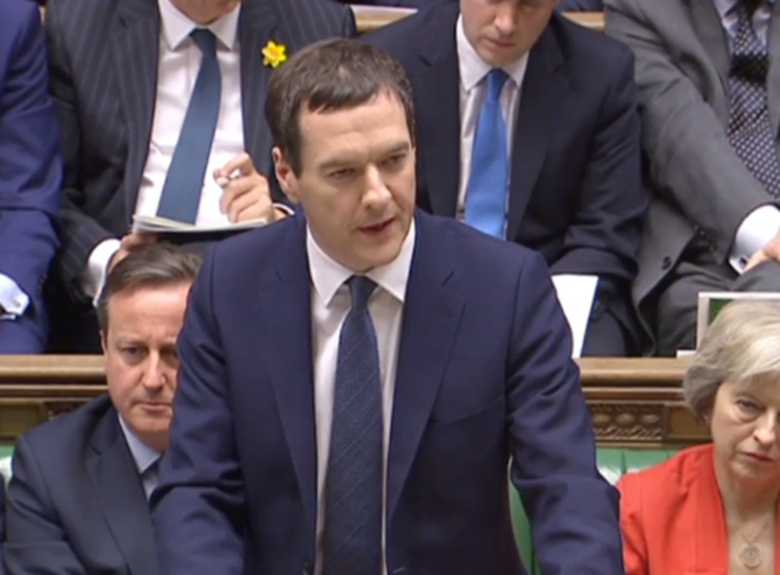Plans to turn all schools into academies come under fire
Jess Brown
Wednesday, March 16, 2016
Government plans to force all schools to become academies have come in for criticism from local authorities and teaching unions.

It has been reported that Chancellor George Osborne will use his Budget speech today to set out plans for all schools to become academies by 2022 at the very latest. The move would signal an end to council control of England’s schools.
Academy status was introduced by Tony Blair's Labour government but was originally intended for schools in urgent need of improvement. However, in 2010 the coalition government, and since last May the Conservative government, have been actively encouraging more schools to convert.
Latest statistics show that 2,075 out of the 3,381 secondary schools in England are academies. Meanwhile, around 15 per cent of primary schools (2,440 of 16,766) are academies.
Roy Perry, chairman of the Local Government Association children and young people board, criticised the plans.
“Forcing schools to become academies strips parents, teachers and faith groups of any local choice," he said.
"We have serious concerns that regional schools commissioners still lack the capacity and local knowledge to have oversight of such a large, diverse and remote range of schools.
“The LGA opposes both forced academisation, and giving significant powers relating to education to unelected civil servants with parents and residents unable to hold them to account at the ballot box."
He said the government's argument that councils prove a barrier to school improvement “defies reason”, pointing to the fact that 82 per cent of council-maintained schools have been rated “good” or “outstanding” by Ofsted.
“Ofsted has not only identified that improvement in secondary schools – most of which are academies – has stalled, but it has praised strong improvement in primary schools, most of which are maintained," he said.
“Additionally, only 15 per cent of the largest academy chains perform above the national average in terms of progress made by pupils, compared with 44 per cent of councils."
Kevin Courtney, deputy general secretary of the National Union of Teachers, said the government's intention is to take power away from local authorities and allow schools to be run for profit.
“Parents will be as outraged as teachers that the government can undo over 50 years of comprehensive public education at a stroke," he said.
“The government’s ultimate agenda is the privatisation of education with schools run for profit," he said.
Last week, Ofsted’s chief inspector Sir Michael Wilshaw said that pupils from multi-academy trusts were underperforming, especially disadvantaged pupils. Courtney said the government's plans fly in the face of this evidence.
“The most urgent problems in schools are to do with the chronic teacher shortage, real-terms funding cuts, the school places crisis, chaotic implementation of the curriculum, and workload going through the roof," he said.
"The drive towards total academisation will do absolutely nothing to fix those problems.”
Mary Bousted, general secretary of the Association of Teachers and Lecturers, said the move is not in the interests of children.
“There’s no democracy in forcing the majority of primary schools, which have chosen to remain working with local authorities, to become academies against their will,” she said.
“As it is, the Department for Education is already unable to control its academies and free schools budget, with costs rising without any improvement in education standards.
“It is hard to see how the government’s plans will work when there aren’t enough high-quality multi-academy trusts to cope with thousands more schools and some trusts are performing as poorly as the worst local authorities according to Sir Michael Wilshaw.”
Education consultant and CYP Now columnist John Freeman said academisation of schools has proved “catastrophically expensive” and not delivered the improvements promised.
In his CYP Now blog, he described the academy programme as being in “disarray”.
“Over the next few years, the process of academisation will itself absorb time and energy – and huge amounts of money, at a time of continued government-imposed austerity – the whole exercise seems beyond pointless,” he added.
Dave Hill, vice president of the Association of Directors of Children’s Services, said changing structures of schools is not enough to improve them.
“Without careful thought and planning the academisation of all schools may be counterproductive, adding further confusion to an increasingly disjointed school system leaving our most challenging pupils at risk of slipping through the cracks," he said.
“Local authorities are responsible for promoting equality for all children and have worked in partnership with schools to share learning and good practice. Our plea is that children and young people are at the forefront of decisions, not political rhetoric."




